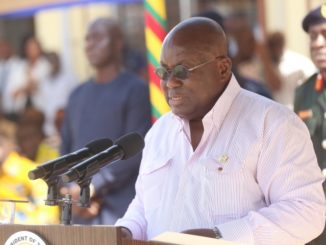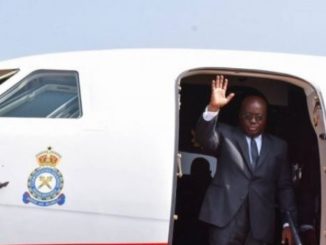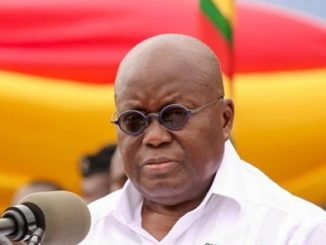 The Director of the Centre for European Studies in the University of Ghana, Professor Ransford Gyampo, has quizzed whether the ruling government still has the so much touted men and women to fix the cedi depreciation challenge in Ghana?
The Director of the Centre for European Studies in the University of Ghana, Professor Ransford Gyampo, has quizzed whether the ruling government still has the so much touted men and women to fix the cedi depreciation challenge in Ghana?
The political science lecturer was reacting to the comments made by President Akuffo Addo, which sort to suggest that importation of goods were to blame on the fast fall of the local currency witnessed.
Prof Gyampo said, “That more imports than exports depreciates a country’s currency, is a text book elementary knowledge. Chris Kwei and T.M Agborgidi taught me this in Economics when I was in Form 5, in the best Secondary School in the whole of West Africa, the West Africa Secondary School (Great WASS). Those were the days we used the text book called “Economics without Tears”.
As noted earlier, it is an already known truism that a country that imports more than it exports, would run into balance of payment deficits and have serious issues with currency stability. The solution to this basic problem, in my view, lies in POLICY (not public dialogue) formulated and IMPLEMENTED by a competent government that has the political will and leadership to accomplish whatever it sets out to do, he added.
The ruling government then in opposition made a huge political capital by going further to brand the John Mahama administration as incompetent in managing the cedi. With the “cedi chasing the dollar” as locals will say, questions continue to be asked, if the Akufo Addo government has what it takes to solve the near currency crisis with any measures to restore confidence in the Cedi?
Prof Gyampo opined that, “Governments as trustees, are instituted to solve problems on behalf of the citizenry. They must not only explain the problems. They must have the competences to act on behalf of the people in fashioning proactive interventions that addresses problems. If such competences are lacking among their appointees, as is experienced in winner-takes-all politics, they must look for experts outside government to help. For, the head of any government that is surrounded by appointees who do not have the expertise and competence to act to deal with problems, would always have sleepless nites”.
Read the full statement here.
1. That more imports than exports depreciates a country’s currency, is a text book elementary knowledge. Chris Kwei and T.M Agborgidi taught me this in Economics when I was in Form 5, in the best Secondary School in the whole of West Africa, the West Africa Secondary School (Great WASS). Those were the days we used the text book called “Economics without Tears”.
2. I know there are other major causes of the currency depreciation problem beyond the basic export-import explanation, and the solution doesn’t necessarily lie in public discourse as advocated by the President, in his interactions with the Ghana Bar Association over the problem.
3. Advocating for a public discourse for the resolution of the fast depreciating currency is anti-thesis to the idea of political trusteeship which serves as the model of representation operated in many democracies. How many citizens understand the causes of the depreciation challenges?. Such public discourse may potentially pander to ignorance as not too many people know the intricacies of the situation.
4. The concept of political trusteeship favors public discourse and consultations with the citizenry ONLY on matters that are beyond the expertise, competence and capabilities of government. Under the theory of political trusteeship, representatives can only consult their constituent-citizenry ONLY on matters that directly affect them and they have superior knowledge about, in terms of solutions.
5. In my candid opinion, it cannot be part of any reasonable argument to say that the ordinary Ghanaian wields superior knowledge on solutions to currency depreciation than government. So, public discourse, though an important ingredient of democracy, is certainly not the best option in resolving this technical issue.
6. As noted earlier, it is an already known truism that a country that imports more than it exports, would run into balance of payment deficits and have serious issues with currency stability. The solution to this basic problem, in my view, lies in POLICY (not public dialogue) formulated and IMPLEMENTED by a competent government that has the political will and leadership to accomplish whatever it sets out to do.
7. Governments as trustees, are instituted to solve problems on behalf of the citizenry. They must not only explain the problems. They must have the competences to act on behalf of the people in fashioning proactive interventions that addresses problems. If such competences are lacking among their appointees, as is experienced in winner-takes-all politics, they must look for experts outside government to help. For, the head of any government that is surrounded by appointees who do not have the expertise and competence to act to deal with problems, would always have sleepless nites.
8. Any government that cannot swiftly assemble the right caliber of people to resolve matters of pressing concerns to the public, has no business being in government. Indeed, a government outlives its usefulness if it calls for public dialogue on matters that many people wield no superior knowledge about.
9. The NPP government, I believe, should still have the men and women, as well as the capacity to scale over the petty shackles of winner-takes-all politics to attract other brilliant non-partisan minds to assist. It is not a crisis situation yet. There is hope to slow down the fast depreciating currency and regime political goodwill.
Yaw Gyampo
A31, Prabiw
PAV Ansah Street
Saltpond
&
Suro Nipa House
Kubease
Larteh-Akuapim
–



